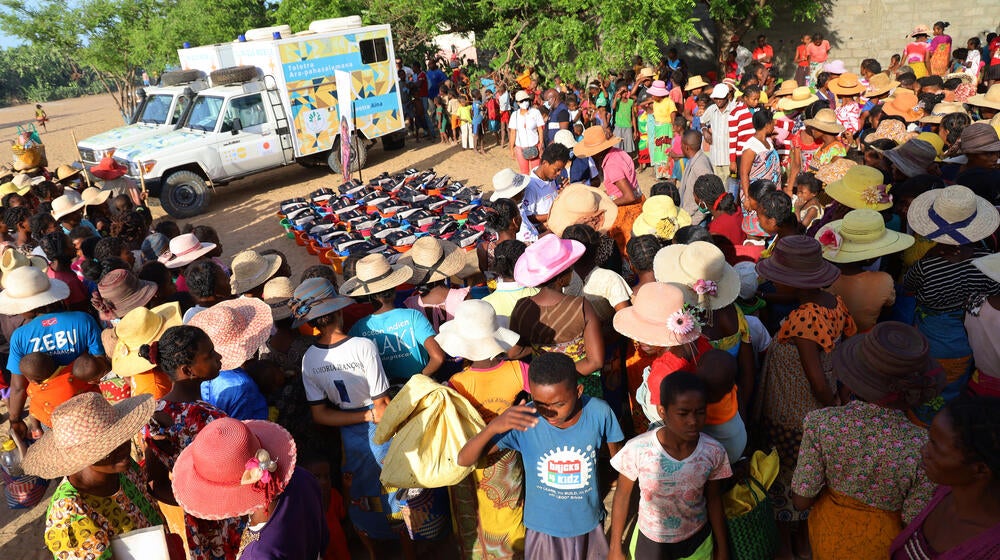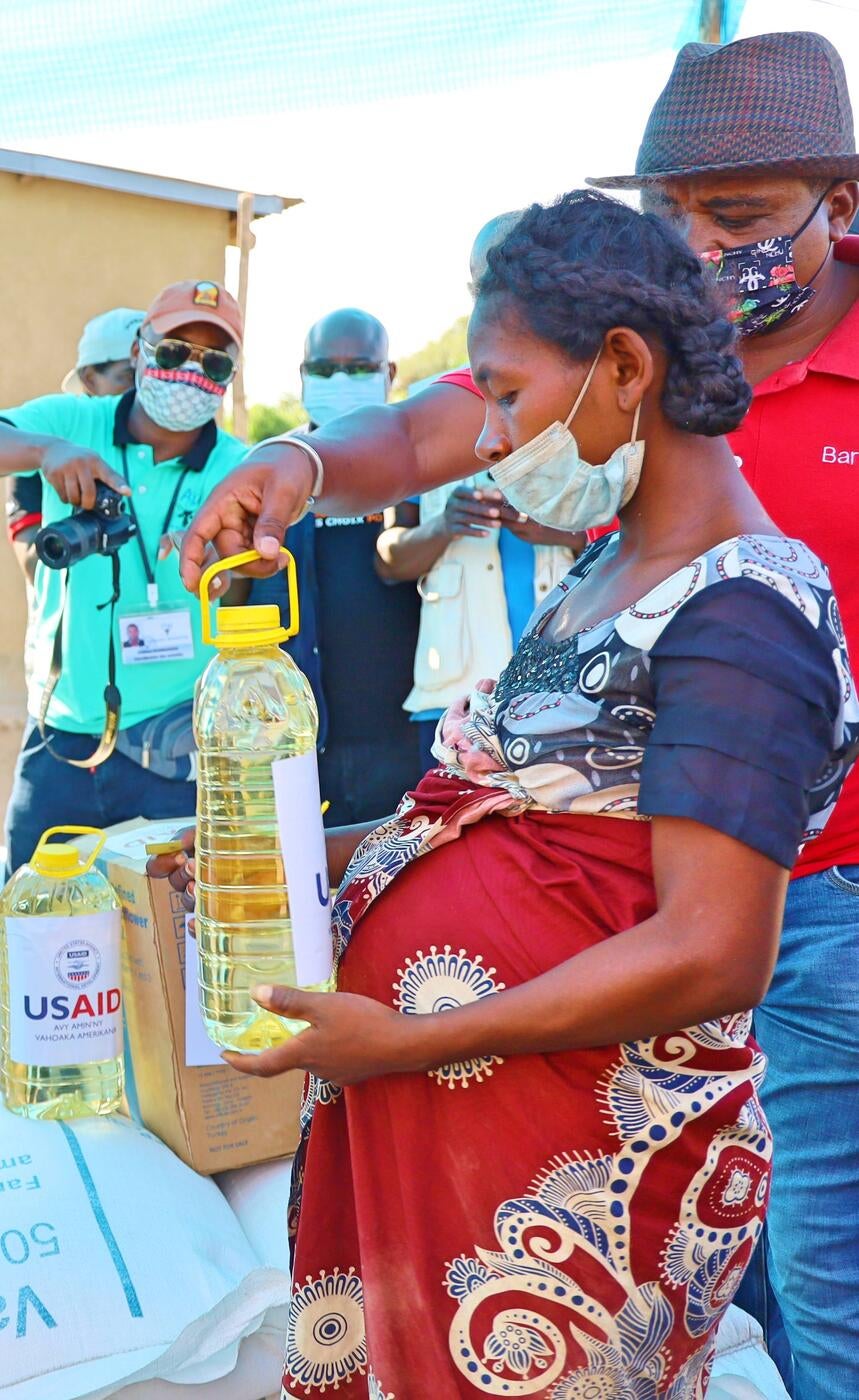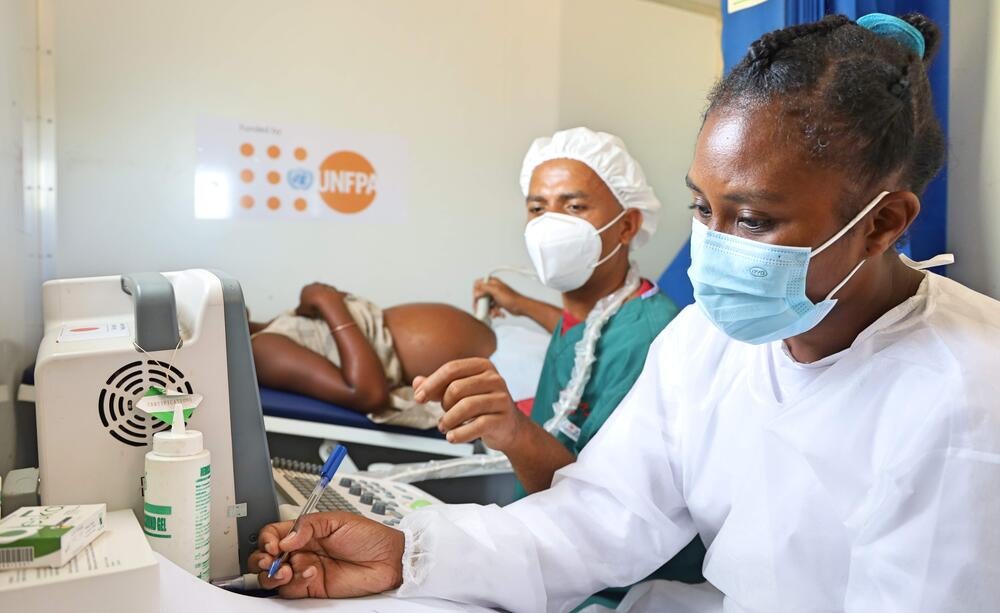UNFPA and WFP join forces to meet soaring reproductive health and nutrition needs in southern Madagascar

AMBOASARY/GRAND SUD, Madagascar – Just weeks away from delivering her fifth child, Homoroe Haova, 33, looked down at her stomach and smiled, reassured she could give birth safely as well as feed her children in the coming weeks.
Homoroe was among 800 women who had waited in line all morning to meet with UNFPA-supported reproductive health specialists. They were visiting her village in Madagascar’s drought-stricken Grand Sud region.

Midwives on site operated from three mobile health clinics procured with generous support from the government of Japan. The clinics are among eight UNFPA-supported vehicles currently deployed in Madagascar. These mobile health clinics travel thousands of miles over rough terrain to reach even the least accessible areas. In nearby maternity tents set up beside the local health center, UNFPA medical staff provided family planning counseling and social workers raised awareness on gender-based violence.
Addressing Food Insecurity
Meanwhile, just a few feet away, hundreds of women, most of them heads of household, collect rations of rice, vegetables and cooking oil. These goods from the World Food Program (WFP) will cover their families’ food needs for the next two weeks. The WFP reports that of nearly 3 million people living in the Grand Sud region, half need urgent food assistance.
Recurrent and relentless droughts have deprived women and girls of any means of providing for themselves or their children. Already prone to climate disasters such as cyclones, floods and drought, Madagascar experienced its worst drought in 40 years in 2021. In the first few months of 2022, the country has already seen cyclones destroy thousands of homes and livelihoods.
Nutritional and reproductive support essential for maternal and newborn health
Through this joint partnership, thousands of households were able to simultaneously access UNFPA’s integrated sexual and reproductive health services and nutritious food rations from WFP. On the day itself, around 180 women received prenatal consultations and 84 accessed ultrasound scans. More than 20 women decided to start using long-acting contraceptive methods such as implants. Another 320 were advised on sexual and reproductive health, gender-based violence and family planning.

The women were also offered screenings and treatment for sexually transmitted infections and cervical cancer. Survivors of gender-based violence were given dignity kits containing sanitary and hygiene products. Some 45 gender-based violence cases were received and either managed or referred to a specialised medical unit.
Gender-based violence, including rape, is devastatingly common in Madagascar, with more than a quarter of all women experiencing physical or sexual violence by an intimate partner. During this record-breaking drought, displaced women and girls now have to travel longer distances to access water and food. This exposes them to yet greater risk of violence.
Visiting the distribution site, the US Ambassador to the United Nations Agencies for Food and Agriculture, H.E. Cindy McCain, hailed the joint initiative. “In any struggling community, women and children bear the brunt. The fact that there is a food distribution to serve both children and adults and a mobile clinic for maternal health, family planning and gender-based violence services, is definitely helping this community thrive,” she said.
Investing in the futures of women and girls
With people unable to access basic health care or enough food, climate disasters have led to chronic malnutrition and spiralling hunger. Pregnant women, new mothers, and newborns, in particular, face a litany of health risks: from child stunting and cognitive impairment to micronutrient deficiencies such as anaemia. Maternal malnutrition can be devastating for individuals and societies as a whole.
Vulnerable families nay resort to child labour, selling their belongings, and transactional sex to put food on the table. According to OCHA, child and forced marriage rates were already highest in the Grand Sud area before the crisis. Since then, gender-based violence and school dropout rates have only increased. Poverty and limited sexual and reproductive health information are exposing girls to teenage pregnancy and sexually transmitted infections, including HIV.
Many remote communities in Madagascar have limited to no access to health centers. Currently, there is just one qualified midwife per 7,000 people. This critical shortage is jeopardizing the safety of new and expecting mothers in the country. Fewer than half of all deliveries are attended by skilled health personnel and some 60 per cent are home births.
UNFPA’s Work
UNFPA has been active in Madagascar for decades, and supports 26 Listening and Legal Advice Centres across the country. These centers offer psychosocial and legal support to survivors, as well as referrals to hospitals and health facilities. UNFPA also has multiple programs to train midwives. Midwives are critcal in a country where seven women and three teenagers die every day from pregnancy and childbirth complications.
At the joint event Ambassador Mc Cain highlighted the humanitarian work of UNFPA and WFP and their role in building the resilience of crisis-ridden communities. “These are all issues that need to be in focus in a situation like this. Everyone involved here today that made this happen is a true humanitarian,” she concluded.